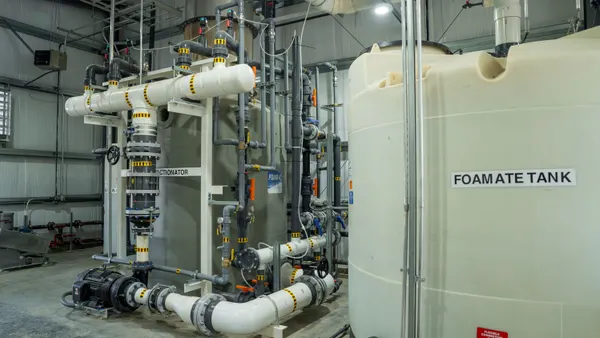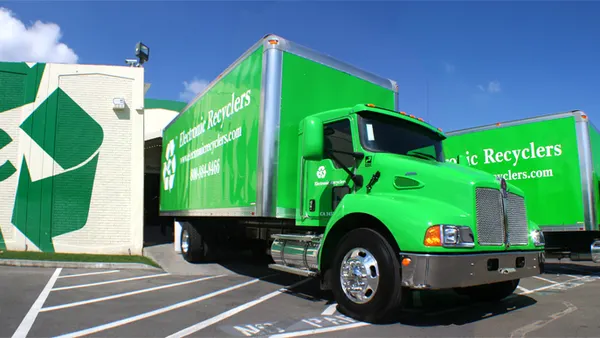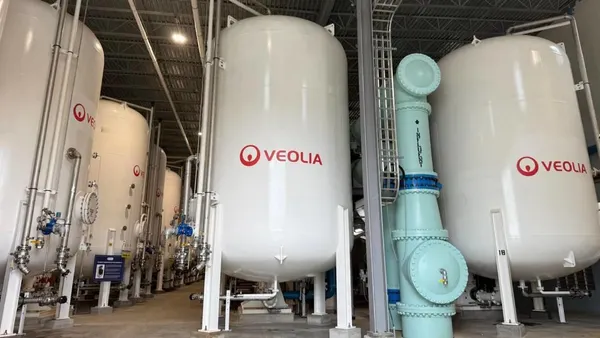A pair of 2021 environmental, social and governance reports Republic Services recently released cover new ground in calling out rising temperatures and changes in precipitation as climate hazards that could cause interruptions to business, diminish productivity, risk worker safety and damage facilities over the next 10 years or more.
Those hazards have been on display throughout the U.S. in recent months. Heat waves, for instance, have prompted haulers in many locations to make collection times earlier to lessen workers’ exposure during the hottest times of day, and companies say they’ve redoubled their efforts on heat safety education and protocols.
“In 2022 Republic is focusing on analyzing chronic changing temperature and precipitation patterns to build an understanding of our exposure to physical climate risks,” the company stated in the chronic physical risks section of its Task Force on Climate-related Financial Disclosures, or TCFD, report, a type of ESG report that Republic was the first in its category to release, followed by WM. Republic’s appears to be the first large public waste company with a TCFD report detailing and analyzing the heat and precipitation risks in this way.
“This analysis allows the Company to identify key locations that may need additional investment in adaptation and mitigation strategies and resources to support resiliency to climate change,” Republic’s TCFD report states. The company’s CDP report similarly includes heat and precipitation analysis.
Addressing heat, Republic noted that roughly 70% of its workforce spends the majority of the day working in a truck, in equipment or in an open-air facility, and the ability to do so and maintain productivity is jeopardized by harsh conditions.
In assessments this year, Republic hasn’t found that heat is correlated with major productivity loss, decrease in employee engagement scores or staff turnover, Sustainability Director Kristin Steiner said. But the company acknowledges that that could change going forward, and rising temperatures will require additional investment in training and safety measures, Republic said in the report.
Since analyzing the rising temperatures trend more closely, the team working on ESG and resilience efforts has strengthened its relationship with operations teams in communicating when peak heat is expected, Steiner said, and it’s being more conscious in communicating with leaders in geographic areas historically less affected by heat. The company continues to focus on making sure supervisors are checking in on how employees are feeling in hot conditions, and it is considering how automation can further help increase the time workers can spend in the cab of a truck rather than doing heavy lifting, Steiner said.
While ESG reporting is voluntary, the industry is monitoring a years-long process by U.S. OSHA to develop a workplace heat standard to ensure protections against heat-related injury and illness.
Regarding increased precipitation, the company stated the biggest implication is the potential for increased levels of landfill leachate. There’s also potential for damage to facilities and subsequent delays in servicing customers. Costs for stormwater management may also go up. Republic said identifying facilities ripe for resilience or mitigation upgrades is a priority. Steiner said this analysis has prompted closer work with business continuity teams in regions less accustomed to heavy storms.
Republic’s reports also acknowledge acute climate risks such as hurricanes and wildfires. The CDP report notes that following Hurricane Katrina, for instance, the company lost close to $1 million in recycling revenue due to the monthlong shutdown of a large recycling facility in New Orleans.
There are additional physical or transition risks in the TCFD recommendations that Republic could analyze, or the company could choose to dive deeper on its analysis of temperature and precipitation, Steiner said. In her view, there’s opportunity to dig deeper on financial assessments of those risks. One example of how the company could further assess the impact of higher temperatures, after looking at its human impact this year, would be to see how it’s affected electricity usage.
The ESG reporting process ramps up in the first quarter, Steiner said. “There's a lot of avenues you could continue to uncover and research, so we haven't completely decided what direction we're going to take TCFD, but we're beginning those strategic conversations.”











